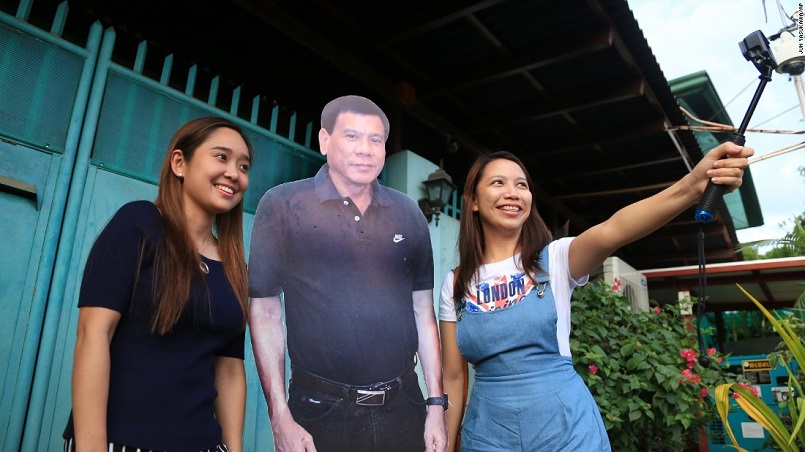
Davao City, on the southern Philippines' island of Mindanao, is the stronghold of the country's outspoken, unrepentant President Rodrigo Duterte.
He was born and raised here. He served as the local mayor for seven terms. Even now, as President, he flies back and forth to Davao City, saying he prefers his own bed to sleeping in Manila's Malacanang Palace, the traditional home of Philippine leaders.
The President has captured the world's attention with his combative and at times vulgar comments. He told the EU they could f**k themselves and called US President Barack Obama a "son of a bitch."
Despite longstanding diplomatic, military and financial ties with the US, he's made clear his intention to realign his international allegiances, cozying up to China and Russia. This weekend, he met with both Chinese President Xi Jinping and Russian President Vladimir Putin before the APEC summit in Lima formally opened. He praised the latter for his "firm" character.
Domestically, he's waging a brutal war on drugs that's claimed thousands of lives and attracted heavy criticism from human rights groups for its use of deadly extrajudicial force.
But his neighbors are fiercely proud of their homegrown leader.
On Duterte's street in the middle class Dona Luisa Phase 1 subdivision, vendors sell T-shirts, mugs and magnets promoting the President's tough guy image.
Outside his house, tourists come to take photos with a life-size cut out. Houses along the street display Duterte portraits on their front gates.
CNN visited his neighborhood to find out how locals think their President is faring.
Anton Uy has high hopes for his country's president.
"I believe he can change the country," says this 16-year-old engineering student.
Growing up in Davao, he says he felt really safe with Duterte as mayor. He's praying for the President, who he describes as "courageous" and "determined."
Although supportive of the President's war on drugs and his emphasis on education, Uy thinks the primary challenge facing the country is a lack of unity. He thinks Duterte can change this.
The teenager's love for the President is clear. "He never gives up. He always knows what the right thing to do is for the Philippines," Uy says.
Uy is less interested in foreign policy and has no opinion on relations with United States or China. He feels Duterte is unlike those that came before him because he runs a clean government, compared to the previous presidents he describes as "really corrupt."
Now 60, retired banker Gary Isla has lived in Davao his entire life.
He believes President Duterte was the best mayor Davao city ever had, so of course he's become the country's best president.
He still refers to Duterte as "our mayor."
Isla remembers Duterte cleaned up the city "step by step," instituting policies like a nighttime curfew and a strict speed limit to cut down on deadly traffic accidents. In his opinion, these changes made Davao a safer place to walk around.
"We have seen what he has done in Davao. How sincere he is. What he says is from his heart."
Isla explains locals are used to the foreign press continually misinterpreting what Duterte says, like his recent comments about severing ties with the United States.
"We understand between the lines," he says, insisting Duterte never meant a full cut of US-Philippines relations.
Jessie Adlao literally has President Duterte to thank for his job.
He runs a stand on the same block as the President's house selling pro-Duterte T-shirts, magnets, stickers and mugs to tourists. Many call the President "The Iron Fist" or "The Punisher."
It's a good business for him, bringing in about $100 a day.
Like 96.6% of voters here in Davao City, Adlao cast his ballot for Duterte. "He is a good man," he says. "He treats everyone equally. He doesn't see anyone as rich or poor."
Specifically, he's impressed by the progress of the President's made in his war on drugs. He thinks the President can really "wipe out" those pushing drugs.
Adlao does regularly get to see the man himself pass by.
Once Duterte even spoke to him, he says, giving his seal of approval his little street business promoting "The Punisher."
Bartender Joseph Repique just finished his first year in Davao City.
He decided to come because his father lived here at 19 and he wanted to experience the city.
"It's the place where you can walk freely and feel safe at night," he says.
He thinks the President's fight against drugs will benefit good the country. Addressing the problem will help the economy, he says. "Poverty makes you do drugs and taking drugs makes you poor."
When it comes to the United States, Repique hadn't heard about Duterte's comments about a separation, but he doesn't like when the president calls Obama names or tells him to go to hell.
"He shouldn't have said that, because he represents the country, the Philippines. The Philippines doesn't really feel that way. America is OK with us."
Susan Medelin wanted to come see President Duterte's home.
One her last day in Davao City for conference, Susan and her friends wanted to come to take pictures with the life-size cutout of the president.
She was surprised when he announced a separation from the United States, but thinks he might have an idea to give other countries a chance. "To make friends with everyone, not just America," she says.
A manufacturer of bags, she wishes Duterte would focus more on improving business conditions at home.
"He is focusing so much on drugs. He should also focus on the economy."
Regarding his fiery tongue and at times off color comments about other countries, she'll give her president a pass. Even she says "bad things" sometimes when she is angry.
"We forgive him. Because when he is angry, he just expresses himself," she says before going to take her selfie with the President.
